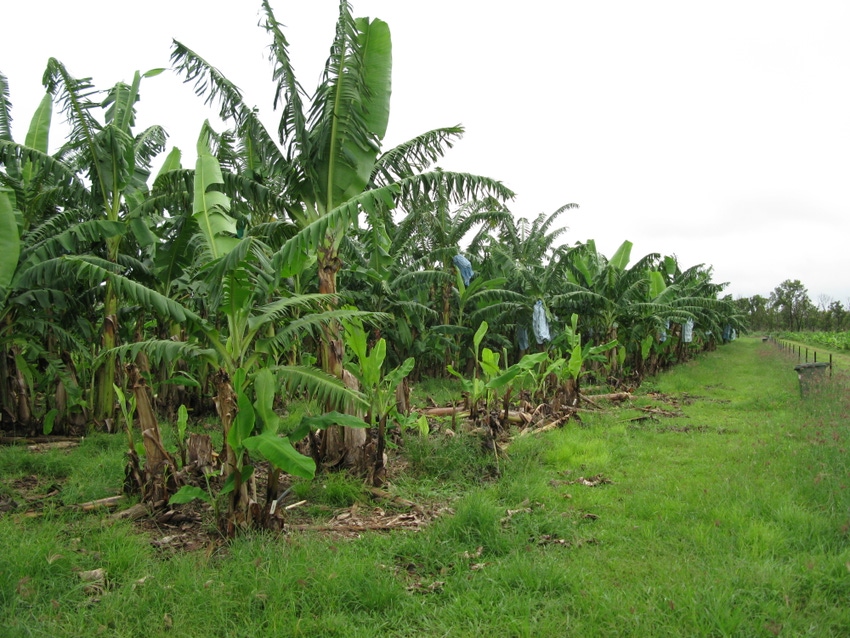Outcome called major step toward protecting $12 billion Cavendish banana global export business.

Researchers from Queensland University of Technology in Brisbane, Australia, have designed genetically modified (GM) Cavendish bananas with resistance to the devastating soil-borne Panama disease. This disease is caused by the fungus Fusarium oxysporum f.sp. cubense Tropical race 4 (TR4) and is also known as Fusarium wilt of banana plants. Scientists from Wageningen University & Research (WUR) in the Netherlands validated the field data.
In the world’s first field trial with GM banana plants conducted in heavily TR4-infested soil, one Cavendish line transformed with a gene taken from a wild banana remained completely TR4 free, while three other lines showed robust resistance. The results have just been published in Nature Communications.
The team cloned the so-called RGA2 gene from the wild progenitor of edible bananas, Musa acuminata ssp. Malaccensis, which has a remarkable resistance to TR4. One modified Cavendish line (RGA2-3) remained TR4 free for the three years of the trial. Three other lines modified with RGA2 showed strong resistance, with 20% or fewer plants exhibiting disease symptoms over a period of three years, WUR reported. In contrast, 67-100% of the control bananas were either dead or heavily infected with TR4 after three years, including the Giant Cavendish somaclonal variant 218, which is currently heralded as being resistant to TR4.
The field trial ran from 2012 to 2015 and was led by Queensland University of Technology distinguished professor James Dale. It was conducted on a commercial banana plantation outside Humpty Doo in the Northern Territory of Australia previously affected by TR4. The soil was also heavily reinfested with disease for the trial.
Dale said the outcome was a major step towards protecting the $12 billion Cavendish global export business, which is under serious threat from virulent TR4.
“These results are very exciting, because it means we have a solution that can be used for controlling this disease,” he said. “We have a Cavendish banana that is resistant to this fungus that could be deployed, after deregulation, for growing in soils that have been infested with TR4.
“TR4 can remain in the soil for more than 40 years, and there is no effective chemical control for it. It is a huge problem," Dale said. "It has devastated Cavendish plantations in many parts of the world, and it is spreading rapidly across Asia. It is a very significant threat to commercial banana production worldwide.”
The research team of WUR tropical phytopathology professor Gert Kema partnered on the project.
“The GM banana lines show that the activity of the RGA2 gene is strongly correlated with the level of resistance to TR4,” Kema said. “This is an absolute breakthrough as it concerns the first identified resistance gene to Fusarium wilt. However, this is only the start — some light at the end of the tunnel. The next step is to deploy the immense diversity in wild bananas to diversify the fruit and establish a resilient and sustainable banana production for all. In 2012, we determined that this banana species has valuable resistance to TR4, and professor Dale’s group has now confirmed this by cloning the underlying gene. Our role was to validate the fungal infections using the molecular techniques that we developed to detect and quantify TR4.”
While Cavendish bananas have been found to also have this RGA2 gene naturally, it is not very active in susceptible plants. New research is looking at how to "switch on" the gene in Cavendish bananas to make them resistant to TR4.
The researchers have begun an expanded field trial on the same plantation, growing the four resistant RGA2 lines and newly developed lines of modified Grand Nain and Williams Cavendish varieties. They have the capacity to screen up to 9,000 plants for resistance and to determine yields and other important traits over the coming five years.
The article, "Transgenic Cavendish Bananas with Resistance to Fusarium Wilt Tropical Race 4," can be accessed here.
About the Author(s)
You May Also Like


.png?width=300&auto=webp&quality=80&disable=upscale)
